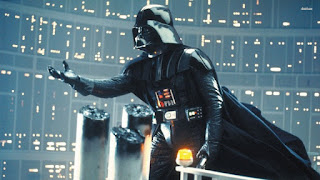Character
Distributed by:
Sony Pictures
Released:
April 1997
Country: Netherlands
The character of the truly "bad father" is a classic of the movies. I’m not just talking about fathers that give
in and let the kid have his dessert without eating his peas, or grooming him to be a mafia don. I’m talking about the kind of father that
does everything to make the kid’s life miserable, beat the crap out of him, or
even try to kill him. Darth Vader in the original Star
Wars trilogy comes to mind. What makes these bad dads so
great is the pure evil within—they don’t hold back and they wear their badness right
out there. It’s what makes them great characters.
Our 1997 BFF winner Character
begins with the introduction of the bad father character with a knife sticking
out of his gut. Well. It took three
movies (not to mention three prequels) to get rid of Darth Vader. So going in, we know we are headed for a
full-on flashback: How did this guy end
up with a knife in his gut? Who is that
guy he had an argument with just before the knife was in his gut? Why am I asking you?
 |
| Dreverhaven: Not the most hug-able guy in the world |
And
so here we go back in time to re-introduce our knife-gutted father. His name is Dreverhaven, and he is some sort
of important Dutch government official in the 1920’s. (Perhaps coincidentally,
“vader” is Dutch for “father,” and the term will figure in prominently in the
film at some point). He seems to have the same sort of role as the
Burgermeister Meisterburger had in the aptly named Sombertown, that of some kind of undefined
autocrat. And come to think of it, the
place he’s in charge of isn’t much different than the Santa Claus Is Comin’ to
Town berg, gray and dreary and depressing and no toys anywhere. One day, Dreverhaven tells his very drab-looking
maid Joba (no, not the Hutt) he needs to see her for a sec in the kitchen;
nine months later, out comes little Jacob.
Joba raises Jacob by herself and refuses Dreverhaven’s repeated
unromantic marriage proposals over the years.
 |
| Burgermeister Meisterburger |
In
the Johnny Cash song A Boy Named Sue, written by Shel Silverstein, Sue’s dad
claims he named the boy he abandoned as a baby with a girl’s name to toughen
him up, saying, “I give ya that name and I said goodbye; I knew you'd have to
get tough or die.” Dreverhaven, the big-shot bureaucrat that he is, takes a different approach: messing with him and trying to ruin his
career at every turn throughout his life. This guy makes
the Burgermeister Meisterburger look like Ronald McDonald.
 |
| Luke, shall we have a catch? |
The
movie spends most of its time seeming to slowly walk us into tearful father/son
hug territory. Will Dreverhaven and
Jacob “have a catch” at the end? (In my
part of the world, a father and son “play catch,” but wherever Ray Kinesella in
Field of Dreams grew up, they “have a catch.”)
It seems unlikely, but then, for a minute, the Burgermeister
Meisterburger enjoyed a moment of yo-yo with the future Santa, so you never
know.
The Title: Karakter.
The Culture: The movie is loosely based on a 1938 novel by
Dutch writer Ferdinand Bordewijk.
Bordewijk wrote in a style called "New Objectivity," which means that he
rejected idealism and romanticism. The “character”
of Dreverhaven is anything but romantic. If 1920’s Netherlands is accurately portrayed
in this brown/grey film, then a shakeup was a good idea. Of course, I’m not sure World War II was the
shakeup it needed.
Agenda Danger: New Objectivity sucks. I’d take a good old-fashioned rom-com over
this. Okay, I don't think I'm willing to go that far.
Best Picture that year: Titanic
 |
| My Big Fat Greek Wedding: Go see this instead . . . KIDDING! |
Rating: The title of the film would seem to indicate
that the plot of the film is less important than the stuff that comprises the
individuals in the story. But I never got a
real handle on what drove Drevenhaven, only that he continually confounded his
son for his entire life, when Jacob could have used a hug from him now and
again. As an art film, it works. As a work of entertainment, it’s not worth
the effort.

No comments:
Post a Comment